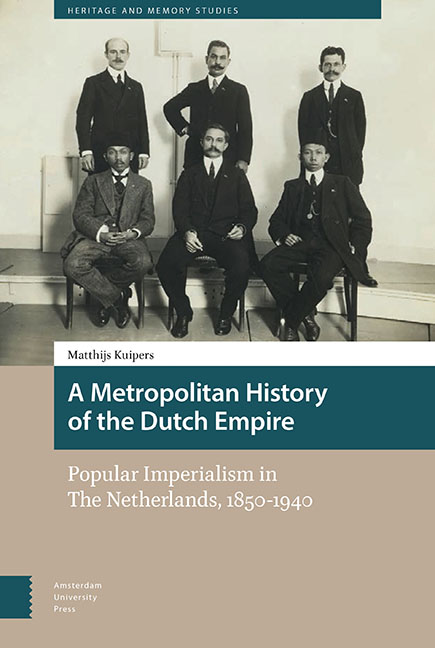Book contents
- Frontmatter
- Contents
- List of Figures and Tables
- List of Abbreviations
- On Names and Terminology
- Introduction: The Still Waters of Empire Run Deep
- 1 Food and Indifference: A Cultural History of the Rijsttafel in the Netherlands
- 2 Indonesians and Cultural Citizenship: The Metropolitan Microcosm of Empire
- 3 Schools and Propaganda: History Books and Schools as Sites of Imperial Campaigns
- 4 Scouting and the Racialized Other: Imperial Tropes in the Dutch Scouting Movement
- 5 Missionary Organizations and the Metropolitan Public: The ‘Inner Mission’ and the Invention of Mission Festivals
- Conclusion: A Fragmented Empire
- Sources
- Index
2 - Indonesians and Cultural Citizenship: The Metropolitan Microcosm of Empire
Published online by Cambridge University Press: 06 May 2022
- Frontmatter
- Contents
- List of Figures and Tables
- List of Abbreviations
- On Names and Terminology
- Introduction: The Still Waters of Empire Run Deep
- 1 Food and Indifference: A Cultural History of the Rijsttafel in the Netherlands
- 2 Indonesians and Cultural Citizenship: The Metropolitan Microcosm of Empire
- 3 Schools and Propaganda: History Books and Schools as Sites of Imperial Campaigns
- 4 Scouting and the Racialized Other: Imperial Tropes in the Dutch Scouting Movement
- 5 Missionary Organizations and the Metropolitan Public: The ‘Inner Mission’ and the Invention of Mission Festivals
- Conclusion: A Fragmented Empire
- Sources
- Index
Summary
Abstract
This chapter tracks the trajectories of three Indonesians in the metropole. It first explores the concept of ‘cultural citizenship’, which helps to understand their strivings in an imperial world that withheld formal citizenship to its colonial subjects. Partial metropolitan biographies of three Indonesians follow, with each of them exemplifying a common attitude towards empire: the path towards assimilation by Wim Tehupeiory (1883-1946), political dissent from Tjipto Mangoenkoesoemo (1886-1943), and the recourse to the arts and to ‘association’ of Jodjana (1896-1972). All three life trajectories show that, in parallel to the Black Atlantic so thoroughly theorized in transatlantic imperial history, there is an Eastern equivalent, an Indisch consciousness of sorts.
Keywords: anticolonial dissent, cultural citizenship, Jodjana, Cipto Mangunkusumo, assimilation, Black Atlantic
If I were a Dutchman, […] I would wish for the independence festivities to be as copious as possible. Yet, I would not wish for the natives of these lands to take part in them. I would prohibit them from cheering along. […] It would be so indecorous, so presumptuous, so inappropriate, if we – I still imagine myself to be Dutch – let the native cheer along in the commemoration of our freedom.
– Soewardi Soerjaningrat, ‘Als ik eens Nederlander was…’ (1913)Several pamphlets in Dutch and Malay have circulated. The first pamphlet If I Were a Dutchman… gave the impression that the Indies compare to the Netherlands in the same way as the Netherlands compared to France a hundred years ago. This depiction is as unfaithful as it is vicious. The Indies were ruled by native kings who oppressed the population. We have brought peace and order, and have treated the population in better ways.
– C.Th. van Deventer, addressing the Dutch Parliament (12 November 1913)As the previous chapter has shown, the presence of colonial subjects in the metropole was, albeit small, not uncommon. But other than domestic servants, who had been present in the metropole for as long as Dutch colonialism existed, (temporary) migration on a larger scale only took off around the turn of the twentieth century. The first Indonesian students arrived in the Netherlands only in the 1890s.
- Type
- Chapter
- Information
- A Metropolitan History of the Dutch EmpirePopular Imperialism in the Netherlands, 1850-1940, pp. 69 - 116Publisher: Amsterdam University PressPrint publication year: 2022



